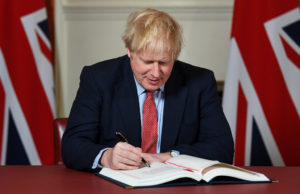Why Boarding Schools Produce Bad Leaders
Psychotherapist Nick Duffell spent 25 years treating boarding school graduates. He talks about how their upbringing in elite, authoritarian environments cut off from their families make them the poor public servants we observe in British politics today.
Psychotherapist Nick Duffell spent 25 years treating boarding school graduates. He talks about how their upbringing in elite, authoritarian environments cut off from their families make them the poor public servants we observe in British politics today.
“The psychological impact of these formative experiences on [Prime Minister David] Cameron and other boys who grow up to occupy positions of great power and responsibility cannot be overstated. It leaves them ill-prepared for relationships in the adult world and the nation with a cadre of leaders who perpetuate a culture of elitism, bullying and misogyny affecting the whole of society.”
“Am I saying,” Duffell asks, “that David Cameron, and the majority of our ruling elite, were damaged by boarding?”
He expands:
It’s complex. My studies show that children survive boarding by cutting off their feelings and constructing a defensively organised self that severely limits their later lives. Cameron, Boris Johnson, Jeremy Hunt, Andrew Mitchell, Oliver Letwin et al tick all the boxes for being boarding-school survivors. For socially privileged children are forced into a deal not of their choosing, where a normal family-based childhood is traded for the hothousing of entitlement. Prematurely separated from home and family, from love and touch, they must speedily reinvent themselves as self-reliant pseudo-adults.
Paradoxically, they then struggle to properly mature, since the child who was not allowed to grow up organically gets stranded, as it were, inside them. In consequence, an abandoned child complex within such adults ends up running the show. This is why many British politicians appear so boyish. They are also reluctant to open their ranks to women, who are strangers to them and unconsciously held responsible for their abandonment by their mothers. With about two-thirds of the current cabinet from such a background, the political implications of this syndrome are huge – because it’s the children inside the men running the country who are effectively in charge.
Boarding children invariably construct a survival personality that endures long after school and operates strategically. On rigid timetables, in rule-bound institutions, they must be ever alert to staying out of trouble. Crucially, they must not look unhappy, childish or foolish – in any way vulnerable – or they will be bullied by their peers. So they dissociate from all these qualities, project them out on to others, and develop duplicitous personalities that are on the run, which is why ex-boarders make the best spies.
Now attached to this internal structure instead of a parent, the boarding child survives, but takes into adulthood a permanent unconscious anxiety and will rarely develop what Daniel Goleman calls emotional intelligence. In adulthood he sticks to the same tactics: whenever he senses a threat of being made to look foolish, he will strike. We see this in Cameron’s over-reaction to Angela Eagle MP, less than a year into his new job. “Calm down, dear!” the PM patronisingly insisted, as if she were the one upset and not he. The opposite benches loved it, of course, howling “Flashman!” (the public school bully from Tom Brown’s Schooldays), but they never take on the cause of these leadership defects.
Read more of Duffell’s essay, including about the societal consequences of what’s expressed above, here.
— Posted by Alexander Reed Kelly.
Your support matters…Independent journalism is under threat and overshadowed by heavily funded mainstream media.
You can help level the playing field. Become a member.
Your tax-deductible contribution keeps us digging beneath the headlines to give you thought-provoking, investigative reporting and analysis that unearths what's really happening- without compromise.
Give today to support our courageous, independent journalists.






You need to be a supporter to comment.
There are currently no responses to this article.
Be the first to respond.